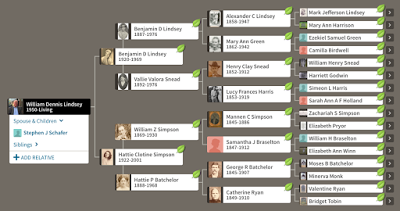
I shared some of this story here a number of years back. Because I told the story again on Facebook today and a Facebook friend encouraged me to share it with wider circles, I'm going to tell it here again, with apologies if you read my previous posting in the same vein several years ago:
I'm thinking today of an uncle of one of Steve's cousins, about whose life we learned on a visit to this cousin several years ago. She gave Steve her albums of family photos to scan and share with other family members. As she did so, she told us a bit of the story of her uncle Enthyeme, to whom she had been very close as a little girl. She showed us a collection of paintings Enthyeme had done, which she cherishes. He was a very talented artist.
There were several pages of photos of Enthyeme in the album, as a boy and young man growing up in Minnesota, and then, in the 1930s, as a handsome young man who left his family's farm in Minnesota to go to California, where he hoped to become an actor. And where he met another handsome young man pictured with him in photo after photo, always laughing, full of life and of hope . . . and very obviously in love.
Enthyeme and his friend "the Virginian," as all the photo labels said, lying side by side on the beach, in a car with the roof down heading out for a ride, standing in front of their apartment building with arms around each others' shoulders, surrounded by other friends . . . .
Good-looking young men with interesting lives stretching out before them, in their 20s, hoping like so many other young people who have gone to California for generations to be the lucky few who find themselves "discovered" by the gatekeepers of the film industry . . . .
And then the war came. And Enthyeme did his duty and enlisted, and before he reached the age of 32, he was killed in battle in Italy, where he lies buried far from any family members . . . . Steve's cousin told us she had never even known details about how her uncle died, that all the family had to tell them about his death was a letter heavily censored by the board that censored military letters in World War II. They did know that he was buried in Italy and had a photo of the tombstone, which Steve's cousin had always wanted to visit, but she had never been able to do so.
There are so many lives like this. All of us can find them in our own family trees if we look hard enough for them, and care to find them — to acknowledge family members who often in the past have been forced to live hidden lives as their families pretend that the visible is invisible. People whose lives and humanity have, for generations, been crippled by a shame often imposed by their own families on them, told to stay hidden, to move away, not to be seen any longer in their small towns — to be out of sight and out of mind . . . .
People who have been told that their gifts and talents don't count, no matter how creative they are, how much they have to give, how much love they have shared with the families that send them packing . . . .
We can't change the past. We can, however, choose to remember, if that matters to us. And we can choose to celebrate now what our families chose to shame, repudiate, and scorn in the past, if we wish to do that. We can also resolve to break the cycle of abuse and shame and to affirm and include family members who, in the past, would have been shoved away and ridiculed solely because of who they were made to love.
If we choose to do that.
For Enthyeme: Bei Dao's "Requiem" for those killed in the Tiananmen Square massacre in his book of poems entitled Old Snow, trans. Bonnie S. McDougall and Chen Maiping (NY: New Directions, 1991) (p. 11):
Not your bodies but your soulsshall share a common birthday every yearyou are all the same agelove has founded for the deadan everlasting allianceyou embrace each other closelyin the massive register of deaths.

